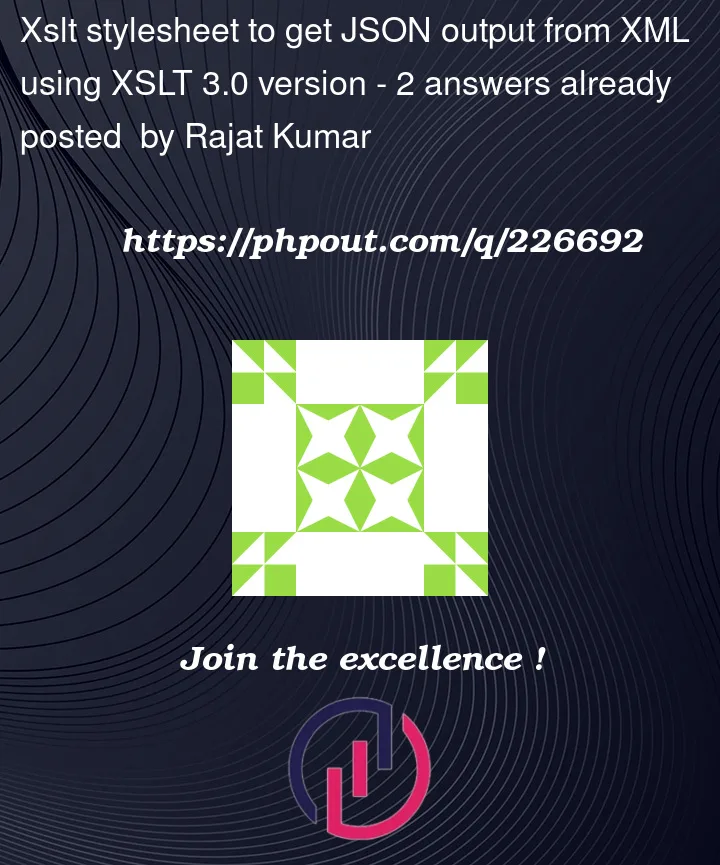I have a Soap XML which contains multiple records. I am working on fetching the data of tags ReportId, PolicyNumber etc. Now this records also has multiple "records" tag within "sf:Case_Responses_GCC_r" tag. I need to create an XSLT file which could help me in transforming this SOAP XML into JSON data. I have done this using XSLT 1.0 but as I am using saxon-js which supports XSLT 3.0 processor.
My XML Data
<?xml version="1.0" encoding="UTF-8"?>
<soapenv:Envelope xmlns:soapenv="http://schemas.xmlsoap.org/soap/envelope/"
xmlns="urn:enter.soap.force.com"
xmlns:sf="urn:sobject.enter.soap.force.com"
xmlns:xsi="http://www.w3.org/2001/XMLSchema-instance">
<soapenv:Body>
<queryMoreResponse>
<result>
<done>false</done>
<records xsi:type="sf:Case">
<sf:ReportId>6896SDRGrt868</sf:ReportId>
<sf:PolicyNumber>445353566</sf:PolicyNumber>
<sf:Case_Responses_GCC__r>
<records xsi:type="sf:Response_GCC__c">
<sf:Id xsi:nil="true"/>
<sf:Question_GCC__c>Available to question?</sf:Question_GCC__c>
<sf:Response_GCC__c>Yes</sf:Response_GCC__c>
</records>
<records xsi:type="sf:Response_GCC__c">
<sf:Id xsi:nil="true"/>
<sf:Question_GCC__c>Relationship</sf:Question_GCC__c>
<sf:Response_GCC__c>Self</sf:Response_GCC__c>
</records>
</sf:Case_Responses_GCC__r>
</records>
<records xsi:type="sf:Case">
<sf:ReportId>5003L005UCcfVVS</sf:ReportId>
<sf:PolicyNumber>87768978</sf:PolicyNumber>
<sf:Case_Responses_GCC__r>
<records xsi:type="sf:Response_GCC__c">
<sf:Id xsi:nil="true"/>
<sf:Question_GCC__c>Available to question?</sf:Question_GCC__c>
<sf:Response_GCC__c>No</sf:Response_GCC__c>
</records>
<records xsi:type="sf:Response_GCC__c">
<sf:Id xsi:nil="true"/>
<sf:Question_GCC__c>Relationship</sf:Question_GCC__c>
<sf:Response_GCC__c>Father</sf:Response_GCC__c>
</records>
</sf:Case_Responses_GCC__r>
</records>
</result>
</queryMoreResponse>
</soapenv:Body>
</soapenv:Envelope>
I have tried using this XSLT but its throwing error with used functions
XSLT I have tried
<xsl:stylesheet version="3.0"
xmlns:xsl="http://www.w3.org/1999/XSL/Transform"
xmlns:soapenv="http://schemas.xmlsoap.org/soap/envelope/"
xmlns:sf="urn:sobject.enter.soap.force.com"
xpath-default-namespace="urn:enter.soap.force.com"
xmlns:json="http://www.w3.org/2005/xpath-functions/"
expand-text="yes"
exclude-result-prefixes="#all">
<xsl:output method="json" version="1.0" encoding="utf-8" indent="yes"/>
<xsl:template match="/soapenv:Envelope">
<xsl:variable name="jsonObject">
<lic lang="en">
<xsl:apply-templates select="soapenv:Body/queryMoreResponse/result/records"/>
</lic>
</xsl:variable>
<xsl:value-of select="json:serialize($jsonObject, map { 'method': 'json', 'indent': true() })"/>
</xsl:template>
<xsl:template match="sf:records">
<xsl:map>
<xsl:map-entry key="reportversion" select="1"/>
<xsl:map-entry key="reportid" select="sf:ReportId"/>
<xsl:map-entry key="PolicyNumber" select="sf:PolicyNumber"/>
<xsl:map-entry key="primarysourcecountry" select="'IN'"/>
<xsl:map-entry key="client">
<xsl:map>
<xsl:map-entry key="summary">
<xsl:variable name="responses">
<xsl:apply-templates select="sf:Case_Responses_GCC__r/records"/>
</xsl:variable>
<xsl:sequence select="json:to-array($responses)"/>
</xsl:map-entry>
</xsl:map>
</xsl:map-entry>
</xsl:map>
</xsl:template>
<xsl:template match="sf:records">
<xsl:map>
<xsl:map-entry key="sf:Question_GCC__c" select="sf:Question_GCC__c"/>
<xsl:map-entry key="sf:Response_GCC__c" select="sf:Response_GCC__c"/>
</xsl:map>
</xsl:template>
</xsl:stylesheet>
Expected JSON Output
{
"lic":[
{
"reportversion":"1",
"reportid":"5003L000005UCcfQAG",
"PolicyNumber": "004176451",
"primarysourcecountry": "IN",
"client":{
"summary": {
"Available to question?": "No",
"Relationship": "Father"
}
}
},
{
"reportversion":"1",
"reportid":"5003L000005UCcfQAG",
"PolicyNumber": "004176451",
"primarysourcecountry": "IN",
"client":{
"summary": {
"Available to question?": "No",
"Relationship": "Father"
}
}
}
]
}




2
Answers
The following should get you closer:
There are various ways to create XDM/XPath/XSLT maps to be serialized as JSON, the suggestion above tries to follow your intention to use
xsl:mapandxsl:map-entry, using just XPath 3.1 expression for XDM maps and arrays might be a bit more compact:you can also use camaro for this
output